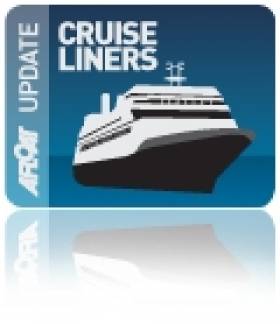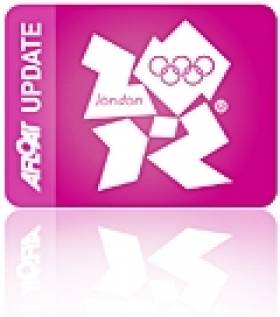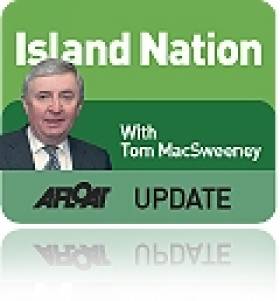Displaying items by tag: London Olympic Games
Olympic Bound Cruiseship On Overnight Dublin Call
#OLYMPIC CRUISESHIP – A cruiseship which is to be used as accommodation ship for key workers during the London Olympic Games is currently on a UK mini-cruise including today's overnight call to Dublin Port, writes Jehan Ashmore.
The cruiseship Braemar (1993/24,344grt) has been chartered by the organisers of the global sporting event for over a month. Around 900 personnel are to use the 195 metre-long vessel as their 'floating' accommodation during the games which is run by the London Olympics and Paralympic Games (LOCOG). Most of the workers will be involved in transportation duties for competitors and officials from 12 July – 15 August.
The vessel is to berth in East London Dock (Albert Dock or King George V) which is close to the ExCel Centre, the exhibition venue which has hosted London Boat Show's over the years, will be used for a number of Olympic events. In addition the location is close to the main transport hub for the Olympic workers and is also nearby to London City Airport.
As a consequence of the cruiseship's 34-day long charter, three cruises have been cancelled by the vessels owner Fred Olsen Cruise Lines.
Guests who were originally booked on the affected cruises on board the Braemar have been offered alternative itineraries. In addition the company provided a goodwill gesture to acknowledge the inconvenience while those passengers who choose not to take up this offer have been given a full refund.
Last month the same owners organised a special Titanic Memorial Cruise which called to Cobh, having completed a mini-cruise to Belfast to mark the historical centenary of the liner's construction at Harland & Wolff Shipyard.
ISAF Release Details of London Olympic Sailing Competition
#OLYMPIC – It must be getting close to the Olympic regatta if the official Notice of Race has been published. ISAF have released the formal details for London 2012 Olympic Sailing competition in its Notice of Race (NOR) document this afternoon. The competition begins on 29 July and runs until 11 August at Weymouth and Portland, Great Britain.
So far three Irish boats have qualified for Weymouth, at least three more attempting to do so in the next few months.
The Notice of Race states the key conditions for the 10 sailing events at the London 2012 Olympic Games and includes details on the rules, regulations, entry and qualification guidelines, format, scoring, schedule, venue and courses.
Athletes, coaches, trainers and other team officials shall comply with the Olympic Charter, as well as with the ISAF rules, in order to be eligible for participation in the London 2012 Olympic Sailing competition, and shall be entered by a National Olympic Committee (NOC). The full NOR is here
Would You Pay to Watch Sailing?
There are those who don't like sailing – and even some in the sport itself – who have described watching a sailing race as "about as interesting as watching paint dry. While exciting pictures have been available from the Volvo Round the World Race and match racing has proved watchable, these were exceptional highlights compared with the more mundane aspects of yacht racing. Raising public interest in the sport has been a permanent difficulty.
The Olympic Games have fared no better. The last Olympics in China were difficult for sailing where the racing was not regarded as of sufficiently high quality, courses were perceived as often poor and there were even difficulties in finding enough clear water at times due to silting and other problems.
With tickets due to go on sail in two month's time for the London Olympic Games in 2012, controversy is flaring over a decision to impose charges to watch sailing.
The 2012 Games will be the first in Olympic history to charge spectators for sailing races, with temporary seating being provided for up to 4,600 paying customers at Weymouth's Nothe Gardens, a local beauty spot which overlooks one of the racing areas at Newton's Cove. Weymouth and Portland Council received official notification about the plan a week before Christmas. This was more than two months after the London organising committee, Locog, announced ticket prices for the Games, including sailing.
The spectator experience at previous Games has been confined to a glimpse of sails through a pair of binoculars, but by bringing the action close to shore, Locog believes it can turn sailing into an exciting spectator sport.
They are hoping that ticket sales will be encouraged by the introduction of new events such as women's match-racing — a series of 20-minute head-to-head races between two boats. This will begin with a round-robin phase before turning into a knockout competition and is intended to form the core of the programme on the Nothe course. It will be supplemented by races involving two of what are regarded as spectacular classes - including the 49ers and the windsurfers.
In the second week of the Games, the course will play host to the final medal races in all boat classes.
This concept of bringing the sport to the fans onshore has the full backing of the International Sailing Federation, which will be hoping for capacity crowds in the temporary stands, where spectators will be asked to pay up to stg£55 each to watch the sailing.
However, local people in Weymouth and Portland are angered by the intention to turn their public park into a ticketed venue. The Council has accused the organisers of not discussing their plans in advance and local councillors claim people are outraged that they will be barred from the park for several weeks.
Locog has defended its decision to sell tickets, saying that, for the first time, sailing will be presented as a true onshore spectator experience, which the International Sailing Federation is keen to develop. The organisers also cite safety concerns, with a ticketed venue allowing them to predict crowd numbers. They insist the move is not motivated by financial gain, but that is, clearly, being questioned.
For those unwilling to pay, there will still be one or two free vantage points near Newton's Cove as well a free site with a big video screen and stage on Weymouth Beach.
Sailing competitions will take place on five courses but only at Newton's Cove will spectators be able to watch from land with the naked eye. Tickets, which will go on sale in March, will range from stg£20 for preliminary races to stg£55 for medal races. Discounts will be offered for children and over-60s.
Locog said councillors were invited to a meeting about Nothe Gardens in October. It added that there would be a public consultation later this year prior to submitting a formal planning application for the use of the park for charged viewing. It will be interesting to see how the Council reacts to that application!
One thing the controversy is doing is, at least, is to highlight the sailing events!
• An interesting sidelight about public interest in sailing is that, while sailing has difficulty in getting television coverage, a total of 506,000 people watched USA TV personality, Oprah Winfrey and the star of the film, 'Master and Commander,' Russell Crowe when they presented a sailing programme from Sydney Harbour.
- This article is reprinted by permission of the EVENING ECHO newspaper, Cork, where Tom MacSweeney writes maritime columns twice weekly. Evening Echo website: www.eecho.ie






























































